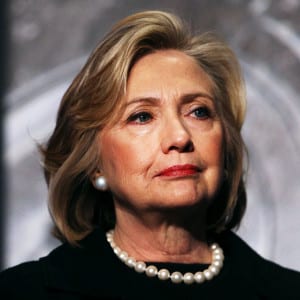By Nicholas Sheppard –
If Hillary Clinton’s bid for the presidency is successful, would it make her the most powerful woman in history?
The proposition is a tricky one, because of all the historical relativism. Making sense of it involves looking at power both in absolute, and global terms.
Unlike other powerful women in history, such as Elizabeth the 1st and Catherine the Great, Hillary Clinton’s ascension wouldn’t be based on a genetic lottery, or palace coup, or a celestial mandate. It would be on merit, with a popular-vote majority (or, at least, an electoral college one).
She would not be a leader irrespective of being a woman, when a man would be considered the norm and the ideal. She would also be the woman with executive power over the second greatest number of people in history: Elizabeth reigned over 4 million subjects; Catherine about 30 million, Wu Zetian, Emperor of China about 50 million.
If elected, Clinton would be the leader of a country of 320 million, second only to Empress Dowager Cixi, who ruled over 410 million, (though China at the time was heavily controlled by foreign nations).
She would not have the absolute, or near-absolute power of a monarch, nor the ability to reign for a long time. To a significant degree she would be constrained by the political process, and by divided government.
She would have limited scope in domestic policy, and would be subject to a refferendum on her performance halfway through her term. She would also be constrained by the U.S. Supreme Court, and the need for Congressional authorization of war and ratification of treaties. Some things would also be subject to ratification in the U.N Security Council.
She would be constrained by a term limit, subject to a second popular vote.
Nevertheless, while Elizabeth’s England, and Catherine the Great’s Russia were on respective edges of Europe, and were only one among a group of powers, Clinton would be Chief Executive of the pre-eminent economic and military superpower, a nation with unparalleled global influence. She would preside over the world’s largest economy, entrusted with the codes to nuclear weapons that can destroy the world hundreds of times over, and be commander in chief of a military that spends more on defense than the next 10 countries combined.
A president has a great deal of latitude in foreign affairs, to pivot to different regions, to organise coalitions and instigate campaigns. Clinton would have the power to authorize covert operations, and maintain a program of drone strikes, killing hundreds, if not thousands of state enemies, via the use of a military-industrial complex the capacity and scale of which her female forebears in power could not even have imagined.
Elizabeth the 1st and Catherine the Great had more direct control over their subjects than Clinton would over her country’s citizenry, but this greater power was restricted to their respective realms. The United States President is still referred to as the leader of the free world, and Clinton would have the most influence to shape things globally of any woman in history.
Catherine the Great accelerated Russia’s modernization and Westernization, making it one of the great powers of Europe. She incorporated Enlightenment ideas into her politics, and expanded the Russian empire by defeating the Ottomans in two major wars.
Elizabeth brought the Renaissance to England, consolidated Protestantism, and defeated the Spanish Armada. England moved toward prosperity and gradually replaced Spain as a World Power. She reigned in an era when government was ramshackle and limited. She was a monarch, but recognised that a monarch ruled by popular consent. She therefore always worked with parliament and advisers. She was generally cautious in foreign affairs, manoeuvring between the major powers of France and Spain.
Elizabeth negated her gender to a certain degree, by a symbolic show of transcending it. Her personality cult as a ‘Virgin Queen’ was part of her complex self-representation, shaping and legitimating the personal rule of a divinely appointed female prince.
This leads to another aspect of Hillary Clinton’s Presidential bid. Her gender will be a net positive, and is something she is using to her advantage in the campaign. It is an adjunct legitimizer that none of her rivals for most powerful woman in history could claim.
This involves looking at Clinton’s modern equivalents, British Prime Minister Margaret Thatcher, and German Chancellor Angela Merkel. In Thatcher’s time, attitudes toward women in public life were not especially affirming.
“Sir: Have things gone too far? My sovereign is a woman; my prime minister is a woman; my boss is a woman; and my wife is a woman.”
— Letter to a British newspaper.
Her gender was a source of angst and uncertainty for her campaign team. Many of her advisors believed that the election would be decided in the crucial marginal seats in the north of England, because of what they called “the Thatcher Factor,” in other words, how the voters would react to the prospect of the first woman Prime Minister.
Thatcher herself was aware of problems her gender might pose.
“I know that one or two men are prejudiced. But after all their prejudice is so, so ridiculous, that doesn’t deal with it …. I just hope that they will take me, as I am, for what I can do. Not as man or woman, but as a personality, who has an absolute passion for getting things right for Britain … does it matter whether it’s a man or a woman? Isn’t it just best to get it right?”
In another interview a reporter asked: “Why did you say that you will not be given another chance if you lose the election?”
“Oh. There’s only one chance for women,” Thatcher responded. “’Tis the law of life.”
Her reservations were backed up by facts. A poll conducted during the 1979 general election found that four times as many respondents (44% to 11%) admitted preferring a man to a woman as a member of parliament, although two-fifths said gender made no difference to them. Furthermore, only 59 percent of the women polled said that they would like to see a woman as prime Minister, whereas 31 percent said that they would not.
The issue for Margaret Thatcher, at the time, was whether she would get elected irrespective of any likely negative or prejudicial views toward her as a woman. With her, it was uncertainty marked with trepidation, and some relief when no negative effects could be registered.
The situation was similar for Angela Merkel. She rose rapidly through the ranks of the Christian Democratic Union, a party with a distinctly non-feminist agenda and a lower than typical share of women members and representatives. She emerged as the reform-minded chairwoman of a party with a deep Catholic and masculine history. At the beginning of the 2005 campaign, only 56 percent of women and 37 percent of men said in principle they approved of a woman being chancellor. By the end of the campaign, 84 percent of women and 70 percent of men did.
She explicitly stated that she did not represent feminism, and she did she explicitly make any appeal to vote for her on gender grounds. By the end of the campaign, gender was not even a side issue. German conservatives accepted her, and she gained the votes of a majority of men.
Here, as with Thatcher, being a woman was initially seen as a potentially negative variable, and an effort was made to negate gender, to make being a woman as irrelevant as possible. Merkel didn’t just explicitly steer away from anything feminist; she talked down or sidled around anything overtly feminine. In a sense, her gender during the campaign was a matter of abstention.
The scenario for Hillary Clinton is substantially different from that of Merkel and Thatcher — and the change in context is, in itself, a triumph for feminism and gender-equality. Clinton’s gender will be a feature, and an unambiguous net gain for her campaign. The only question is, to what extent?
A recent Bloomberg poll seemed to imply that the historic notion of a woman becoming U.S. president, whilst a net positive, won’t be a major influence on voting attitudes. The vast majority of poll respondents, 83 percent, said they wouldn’t be more or less inclined to vote for Clinton because she would be the first female president. Twelve percent were more inclined, 4 percent less.
As is typical for Clinton, more women viewed her favorably in the poll than men, 54 percent to 42 percent. Seventeen percent of women said the idea of electing the first female president makes them more inclined to vote for Clinton, more than double the percentage of men.
Digging deeper into the numbers reveals that the net-positive for Clinton from the Bloomberg poll may in fact be larger. The gender gap in the 2012 presidential election was the largest in history — women strongly favored President Obama with a 20-point spread.
Perhaps more importantly was the number of women who turned out to vote in the 2012 election. Looking at the voting population overall, the gender split, on election day, was 47 percent to 53 percent in favor of women.
Assuming that gender split was replicated in 2016, then that 17 percent of women more inclined to vote for Clinton as the first female President, would in fact be an exponentially higher percentage of the overall popular vote. In this very likely scenario, translated to election day turnout, the poll findings would be skewed more favorably toward Clinton, among all voters. This would translate to upwards of 15 percent of the electorate more inclined to vote for her because of her gender, and as low as 2 or 3 percent less inclined — a net positive for Clinton of about 12 percent. An asset of that magnitude could very well be influential.
Besides the distinction of autonomous, as opposed to democratically constrained power, the claims of Elizabeth the 1st and Catherine the Great are bolstered by longevity. Both ruled — shaping the lives of their subjects, and their nations’ spheres of influence — for decades.
There is, therefore, a subtle but important distinction. If elected, Hillary Clinton would become, if not the most powerful woman in history, then certainly the woman with the most power in history.
Her career as a whole should also be placed in context. She spent eight years living in the executive mansion, establishing her own staffed office there. She then spent eight years in the legislative upper body, made a viable bid for the presidency, then spent four years as Secretary of State, the highest cabinet position.
She has been near, or in, the highest echelons of power, in the most powerful country, for a quarter of a century. If her term as president was domestically and geo-politically consequential, then that, combined with her overall legacy, would make her the best contender for most powerful woman in history.














